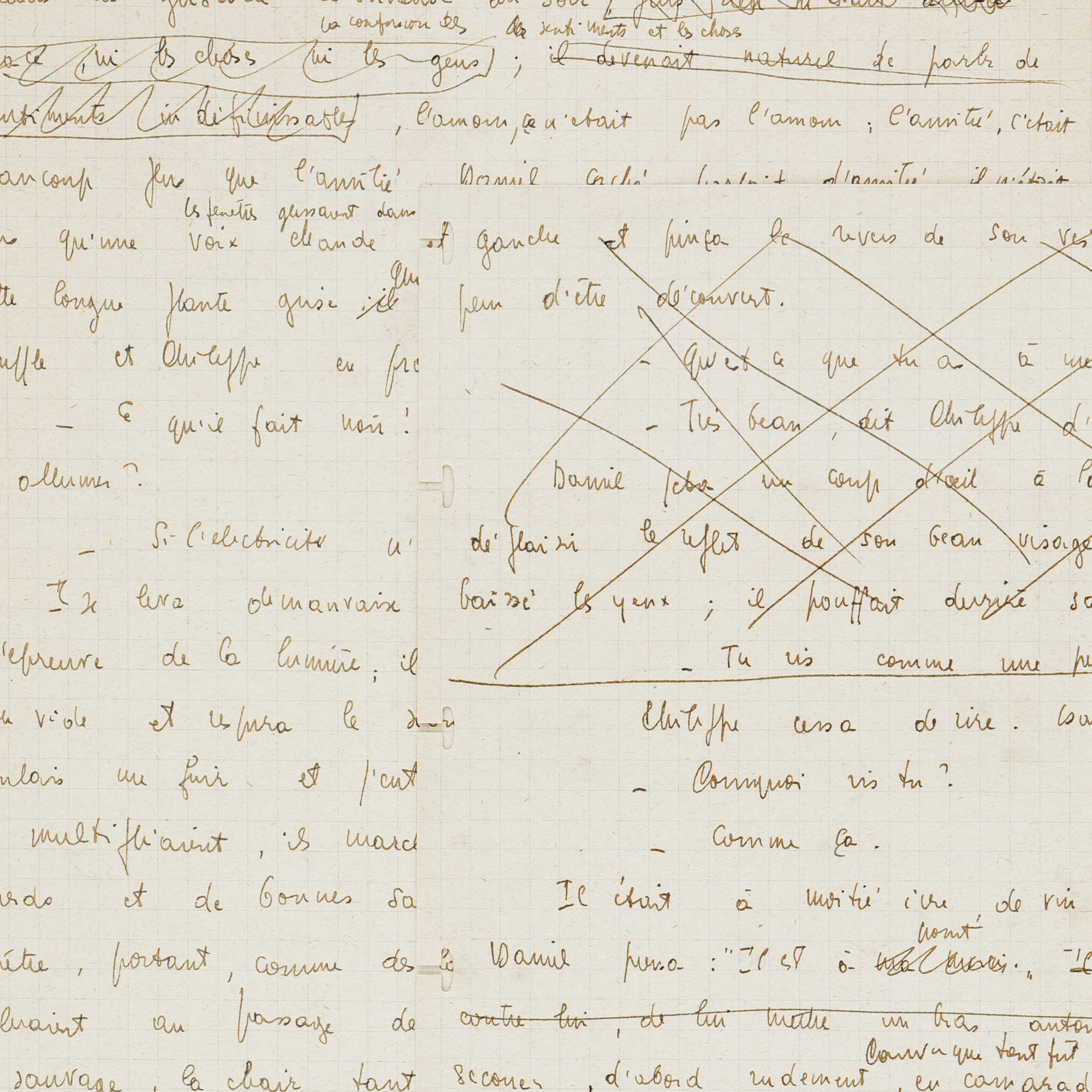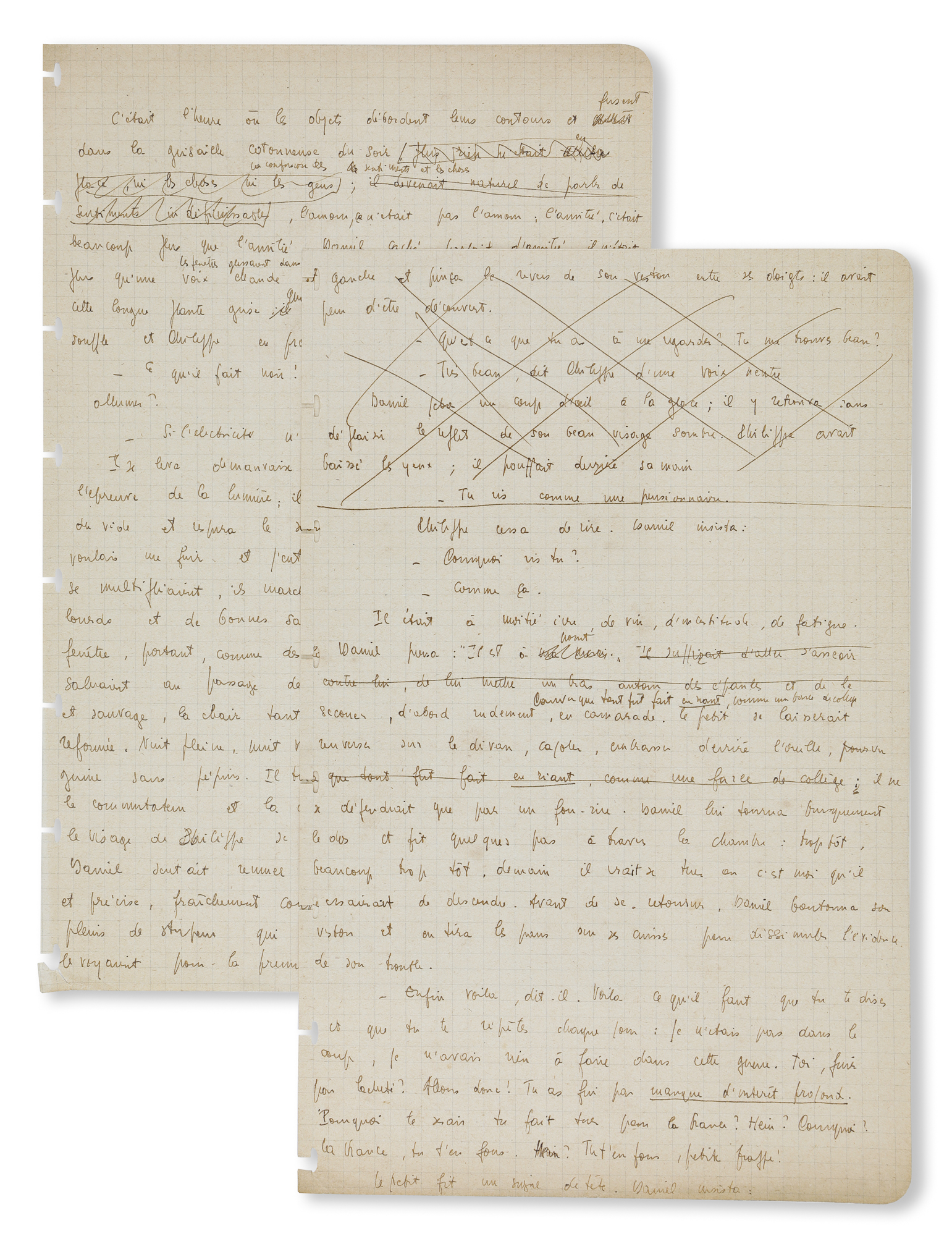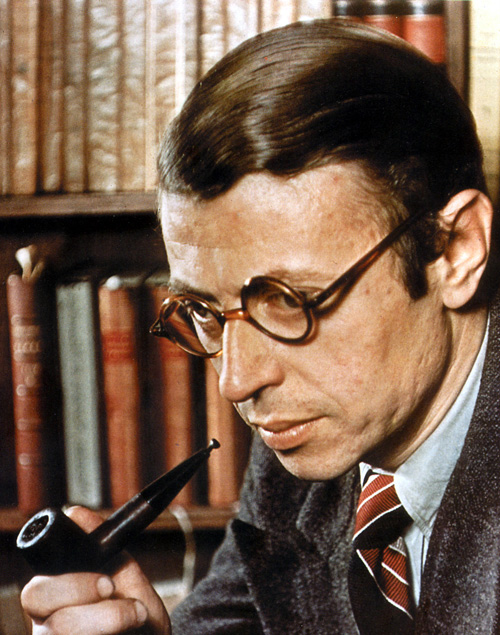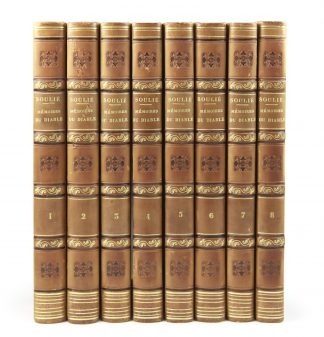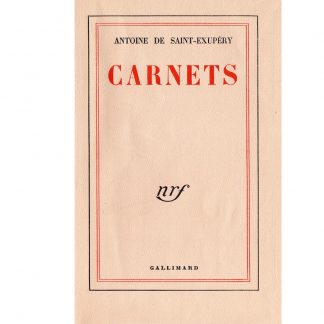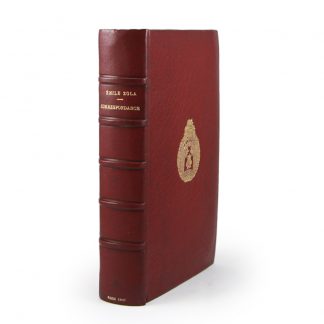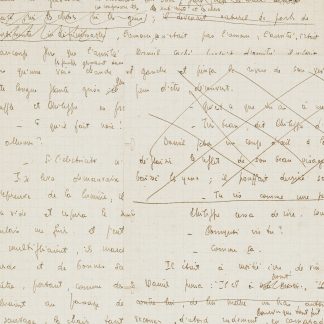Description
AUTOGRAPHIC MANUSCRIT OF 2 LEAVES OF AN EXTRACT FROM DEATH IN THE SOUL(3rd volume of Les Chemins de la Liberté), featuring the characters of Philippe and Daniel. The manuscript, on which appear several repentancespresents differences in form with the final text.
According to a note in the Pléiade edition, two sets of manuscripts of La mort dans l'âme are known: these two leaves probably come from the so-called "Paris" manuscript. They are in fact written on "T-ring" paper, like the 3rd quire of the Paris manuscript, which covers this section of the novel. Formerly the property of a member of Sartre's entourage, the manuscript has been dispersed. Very accomplished, it "seems [in many cases] more correct than the published text", and "even seems to present a more elaborate version of the work than the text that was finally published by Sartre". (Sartre: Oeuvres Romanesques. 2018. pp. 2024-2025).
Daniel, walking through occupied Paris, meets Philippe, a young deserter about to commit suicide. Daniel dissuades him and invites him to his home, planning to seduce him -- the scene takes place in Daniel's flat:
"It was the hour when objects burst out of their contours and rocket into the cottony greyness of the evening. [Nothing was in place, neither things nor people ] the confusion of feelings and things [it became natural to speak of indefinable feelings] love was not love; friendship was much more than friendship; Daniel, hidden, spoke of friendship, he was no more than a warm and calm voice. The windows slid into the half-light with a long, motionless movement; the bedroom was a window. Philippe, mute on the sofa, was this long grey plant that did not intimidate. Daniel caught his breath and Philip took the opportunity to say:
- It's so dark! Don't you think we could turn the lights on?
- If the electricity isn't cut off!" says Daniel.He got up reluctantly: the moment had come to undergo the test of light; he opened the window, leaned over the void and breathed in the silence: so many times [leaning] on the balcony of this very window, I wanted to flee, and I often heard footsteps, they grew and multiplied, they walked on my thoughts, from day to day and good rubicund health crossed under my window, carrying, like lanterns, good consciences that greeted each other as their fires passed. The dead. The street is soft and wild, the flesh so many times torn by the night has reformed; Full night, virgin night, night without men. Beautiful seedless blood? He drew the blinds reluctantly, turned the bedroom door and threw himself out of the shadows, Philippe's face pushed up against Daniel's eyes, Daniel could feel that enormous, precise head, freshly cut, upside down, moving in his gaze, with eyes full of astonishment that fascinated him as if they were seeing him for the first time; he raised his hand [ left and pinched the lapel of his jacket between his fingers: he was afraid of being discovered.
- Why are you looking at me like that? You think I'm handsome.
- Very beautiful," says Philippe in a neutral voice.Daniel glanced at the mirror; he saw the reflection of his handsome, dark face again without displeasure. Philippe had lowered his eyes; he chuckled behind his hand.
- You're laughing like a boarder. ]
Philippe stopped laughing. Daniel insisted:
- Why are you laughing?
- Like thisHe was half-drunk with wine, uncertainty and fatigue. Daniel thought: "He's at the end of his rope. [ at my mercy. All I'd have to do is sit down next to him, put an arm around his shoulders and] shake him, roughly at first, like a friend. The boy would let himself be rolled over on the sofa, cuddled, kissed behind the ear [as long as it was done laughingly, like a school prank]: he would only fight back with a fit of giggles. Daniel turned his back abruptly and took a few steps across the room: too soon, much too soon, tomorrow he would kill himself and it would be me he would try to shoot. Before turning round, Daniel buttoned up his jacket and pulled the sides over his thighs to hide the evidence of his trouble.
- Well, that's it," he says. That's what you have to tell yourself and repeat to yourself every day: I wasn't part of it, I had nothing to do with this war. You, running away out of cowardice? Come on! You ran because you didn't care. Why would you have got yourself killed for France? Why? Why should I? You don't give a damn about France. Don't you? You don't give a shit, you little punk!
The boy nodded. Daniel insisted:
The scene in the manuscript shows a number of formal differences from the definitive text (pp. 1284-1286 in the Pléiade): cuts, additions, words replaced by another... For example:
he opened the window, leaned over the void and breathed in the silence: so many times [leaning] on the balcony of this same window, I wanted to flee, and I often heard footsteps, they grew and multiplied, they walked on my thoughts, from day to day and good rubicund health crossed under my window, carrying, like lanterns, good consciences that greeted each other as their fires passed. [manuscript]
becomes :
He opened the window, leaned out over the void and breathed in the violet scent of silence: "So many times, in this same place, I wanted to flee and I could hear footsteps growing, they were stepping on my thoughts." (p. 1285)
Daniel is involved in The Paths to Freedom from The Age of Reason He solves the protagonist's problem by offering to marry Marcelle, who is pregnant by Mathieu. His motives, however, are far from altruistic: forced to conceal his homosexuality and consumed by shame, he jealously guards the couple and works towards their separation. In Death in the SoulHaving escaped mobilisation, he became a witness to the Paris of the Occupation. It was during one of his walks through "German" Paris that he met Philippe, the pivotal character who first appeared in Le Sursis Philippe plays a structuring role in the novel, since he is the only one to interact with all the other fictional characters. At times reminiscent of Baudelaire, at others of an adolescent Sartre "if he hadn't chosen to save himself by writing and if the guère hadn't caught up with him" (Isabelle Grell), Philippe disappears from the novel after this scene.
2 "T-ring" leaves handwritten on the front in brown ink.

